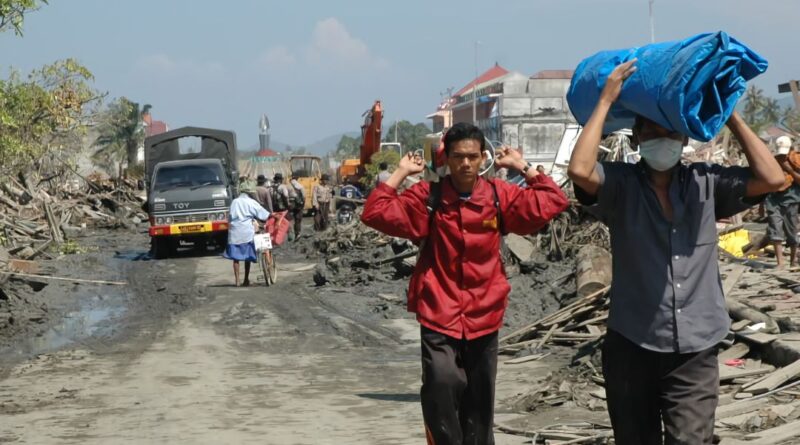How should a Muslim respond to calamities?
Assalamu’alaikum Sobat Halal-Mu
Musibah is a term used to describe events or occurrences that have a negative or detrimental impact, whether in the form of natural disasters, accidents, or other bad situations. Calamities often cause suffering, loss, or hardship for individuals, groups, or communities.
In a religious context, calamities can be considered as tests or trials given by God to His people, who are faced with difficulties to test their patience and faith. In Islam, calamities are often faced with an attitude of patience and tawakkal (surrender to God).
Examples of calamities include: earthquakes, floods, accidents, loss of property, or even the loss of our loved ones.

When calamity comes we all feel sad, but sadness is a natural thing. Indeed, this is very humane, but if we interpret it more deeply, we will realize that all of this is actually sunatullah, there will never be a break from calamities and life tests for every human being ordained by Allah SWT.
What is the best guidance in responding to all the calamities that occur?
According to Muh. Hanafi, SS, M.Sy, an Analyst of Ummah Development at the Section of Islamic Religious Information and Information Systems, the following is the best guidance in responding to calamities, namely:
- Faith and acceptance of Allah’s decree (qadar).
Every Muslim must believe that any disaster has been determined by Allah SWT in Lauhul Mahfuzh. In accordance with the obligation to accept Allah’s provisions gracefully (ridha). Allah SWT says, “Not a single calamity that befalls the earth or yourself was written in the book (Lauhul Mahfuzh) before We created it. Surely that is easy for Allah.” (QS al-Hadid [57]: 22).
- Patience in the face of calamity.
This is the attitude that one must have when facing calamity. In addition, it is recommended when a disaster occurs to say the sentence istirja’ (Inna lillaahi wa innaa ilaihi raaji’uun). Allah SWT says, “And indeed We will test you, with a little fear, hunger, lack of wealth, soul and fruit. And give good news to those who are patient, and those who, when calamity strikes, say: “Inna lillaahi wa innaa ilaihi raaji’uun”. (QS al-Baqarah [2]: 155-156).
Thus, be patient. Do not abandon patience by despairing or prejudging that Allah will not provide goodness in the future. Remember, despair is su`uzh-zhann billah (prejudice against Allah). Su`uzh-zhann to humans is not allowed, let alone to Allah.
- Knowing the wisdom behind calamities
A Muslim who knows the wisdom (secret) behind calamity, will have perfect mental toughness. The wisdom of calamity includes the forgiveness of sins. The Prophet said, “No Muslim is afflicted with a thorn or more than that, except with it Allah will erase some of his sins.” (HR Bukhari and Muslim).
Another wisdom is, if Muslim children die, later they will enter heaven. The Prophet said, “The children of the Muslims [who die] will enter Paradise. They were raised by Prophet Ibrahim AS and Sarah (his wife), until they will be returned to their mother’s father on the Day of Judgment.” (Reported by Ahmad, Ibn Hibban, and Al Hakim. It is considered a hasan hadith by Al Albani in As Silsilah Al Shahihah, no. 1467).
- Keep making efforts
What is meant by endeavoring is to keep making efforts to improve the situation and avoid the dangers that arise from calamities. So, a Muslim should not stand idly by, or passively wait for help to come. Therefore, believing in Allah’s decree does not mean that we just sit around lamenting our fate, without trying to change what is happening to us. Allah says, “Verily, Allah does not change the condition of a people until they change the condition of themselves.” (QS ar-Ra’du [13]: 11).
- Increase prayer and dhikr.
It is recommended to increase supplication and dhikr for those who are afflicted by calamity. One who is willing to pray and dhikr is more honorable in the sight of Allah than one who is unwilling or lazy to pray and dhikr.
Dhikr will be able to calm the hearts of people who are anxious or stressed. Dhikr is like cool ice water that can cool the throat when the weather is scorching hot in the desert. Allah SWT says, “Remember, only with the remembrance of Allah does the heart become calm.” (QS ar-Ra’du [13]: 28).
Hubungi Kami
WhatsApp: 081211003241
Email: lphkht@muhammadiyah.id
Alamat: Jl. Menteng Raya No. 62, Kebon Sirih, Jakarta Pusat, DKI Jakarta




